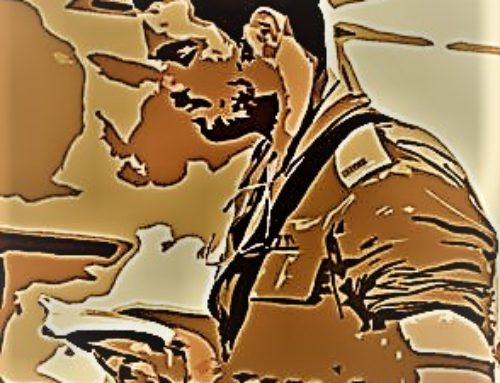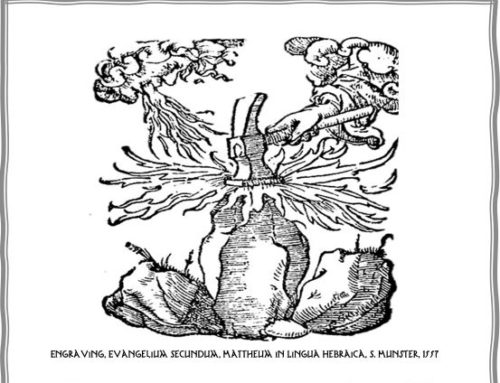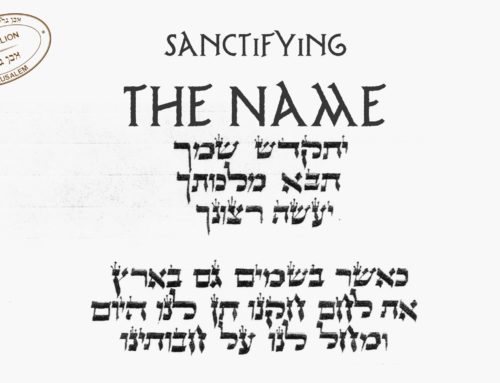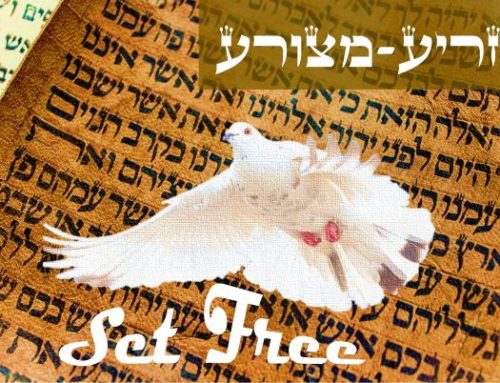Torah Portion, Shemini, Leviticus 9.1-11.47, Haftarah, Samuel II 6:1-19
“It came to pass on the eighth day that Moses called Aaron and his sons and the elders of Israel.” Leviticus 9.1 NKJV
I listened as my grade school teacher taught us how to count. Ten graphite sticks laid before us were manipulated by adding and subtracting. Quickly we became used to thinking in terms of 10. Ten fingers, ten toes. Then came the day when our “base ten” world exploded. There were ways of seeing numbers in base eight or even a binary system. Our Torah portion begins with “And it came to pass on the eighth day.” Since creation, our world is built on the cycle of seven. We think in terms of seven days in the week, and in Israel seven year cycles.
In both modern and Biblical Hebrew, days of the week are not named as in other cultures. The first day of the week is simply called, “day one”. This pattern continues until the seventh day which is given a name, “Shabbat”, meaning rest. Why am I telling you something so basic? Because it really is dramatic when the Bible speaks of an “eighth day”. If seven represent a natural order, the eighth speaks of breakthrough to the Supernatural.
I. A Supernatural Day
“Then Aaron lifted his hand toward the people, blessed them, and came down from offering the sin offering, the burnt offering, and peace offerings. And Moses and Aaron went into the tabernacle of meeting, and came out and blessed the people. Then the glory of the Lord appeared to all the people, and fire came out from before the Lord and consumed the burnt offering and the fat on the altar. When all the people saw it, they shouted and fell on their faces.” Leviticus 9.22-24 NKJV
Leviticus describes the mysteries of the eighth day. There is an eighth day circumcision, and an eighth day presentation of the man or woman healed of leprosy before the Lord at the Tent of Meeting. Genesis shows the natural order of a seven day wedding cycle (Gen. 29.27), and a release from sitting “Shiva” (Gen. 50.10, Job 2.13) seven days mourning for the death of a loved one. It is both emotionally healthy and physically liberating to released from the natural cycle into the wonder of the eighth day.
Aaron and his sons had ministered for seven days, sacrificed, offered blood on the altar. All the while, there was no mighty move of God in the Sanctuary. Suddenly, however, on the eighth day as Aaron ascended the altar before the people and sprinkled the atoning blood upon the altar, the power of God fell consuming the sacrifice, instinctively the people fell on their faces in worship.
II. A Sacred Day
Strange Fire in the House of God
It is a fearful thing to entering the Supernatural presence of God. In the realm of God’s presence and fire, we encounter His holiness. For a moment we will look at the tragedy of Nadab and Abihu on the “eighth day”. Some might say, “Oh, that is an Old Testament story, and God does not deal with people harshly today. Do not be fooled. Ananias and Sapphira speak to us from the New Testament, warning us that treating the holy as profane is just as dangerous.
Nadab and Abihu, intoxicated with excitement grabbed censers, filled them with incense and added “strange fire” to the work of God. (Lev. 10.1) Suddenly, the fire of God broke out from altar consuming them.
We might ask, what went wrong on this sacred “eighth day”? What was their strange fire? Can we be guilty of bringing something profane into His presence? Their “strange fire” might simply have been an unauthorized fire. I am sure that these boys did not intend to go beyond the command, yet they were guilty in adding their own mixture of plans to His presence. We may also have a clue to what went wrong in the following verse.
“Then the Lord spoke to Aaron, saying: “Do not drink wine or intoxicating drink, you, nor your sons with you, when you go into the tabernacle of meeting, lest you die. It shall be a statute forever throughout your generations, that you may distinguish between holy and unholy, and between unclean and clean.” Leviticus 10.8-10 NKJV
Something impaired these priest’s judgment so much that they could not distinguish between holy and unholy. Were they also intoxicated with strong drink? Likely!
This was a tragic lesson for the priestly family. But the truth is that we desperately need an eighth day breakthrough. The answer is not to remain in our sinful condition for fear of the holiness of God. We need His transforming fire. For seven days a baby boy in Israel is without a name. In anticipation, they await the eighth day of circumcision when a new name is shouted. Salvation is a circumcision of the heart. It is an eighth day celebration in heaven when our name rejoiced over in heaven.
III. A Spiritual Day
Messiah’s Eighth Day Breakthrough
This week’s Torah portion coincides with Passover week in this year. It reminds us that there is a “Morrow after the Sabbath”. (Lev. 23.15) In the year that Yeshua was crucified, his body lay in the tomb for most of the Sabbath. The morning of the first day of the week, in that year was the special moment called the “morrow after the Sabbath” traditionally beginning the counting of the Omer. So yes, Messiah rose on the first day of the week; but spiritually it was an eighth day, a new morning of hope. The economy of salvation had been realized. The transfer of funds were deposited and available. St. Augustine, spoke of the mystery of Messiah’s eighth day revealed in both His circumcision and resurrection on the eighth day!
“…Of Christ, He suffered voluntarily, and so could choose His own time for suffering and for resurrection on the third day, which we call the Lord’s day, the day after the Sabbath, and therefore the eighth, proved the circumcision of the eighth day to be also prophetical of Him. For what does circumcision mean, but the eradication of the mortality which comes from our carnal generation.”[1] Augustine of Hippo
The power of the eighth day is its transcendence of the seven-day cycle. It transcends the economy of death and speaks of new life and great hope. Does the “eighth day” nullify the Sabbath day as some Christians have taught? Absolutely not! The Sabbath cycle of God’s law is still in force. We live within that cycle and nature breaths according to that cycle. Simultaneously however as followers of Messiah we also dwell in the “morrow after the Sabbath”, an “eighth day” of salvation and hope for the resurrection. (1 Thessalonians 4:13-18)
Conclusion
How then should we approach this eighth day of revelation. Nadab and Abihu became intoxicated by the manifestation of God’s presence unable to distinguish between holy and profane. Because of that, they were not able to live in the eighth day. We stand before the Great High Priest, the King Messiah, and He too calls us to enter salvation sober, distinguishing between holy and common.
God is calling us to breakthrough the cycles of sin, fear, depression, sickness, and backsliding. Those who seek the Lord with all their heart do come to a place where the power of God fills the sanctuary of our lives. Let us learn to be sober in holiness. Soon the One who rose on the eighth day will return in a moment “neither day nor night”, (Zech. 14.7) transcending the laws of nature. May He come speedily, and in our days.
Shavua Tov from Zion.
[1] Augustine, The Works of Aurelius Augustine, Bishop of Hippo, trans. Marcus Dods, vol. V (Edinburgh: T & T Clark, 1872), 309.
